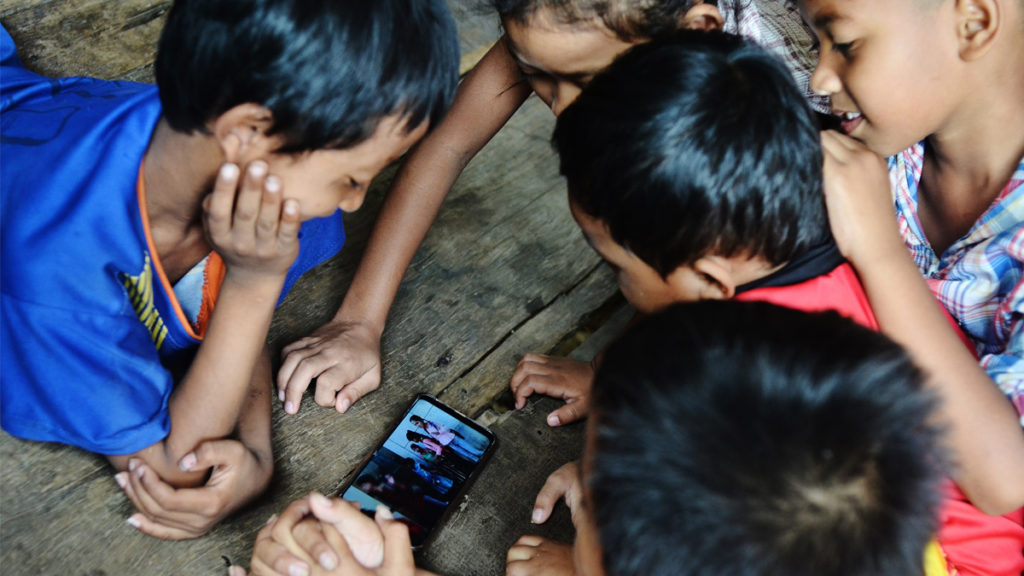“We need to be conscious that the internet does not replace reading time or play and physical activity time, or time with family...These are very important activities in children’s development.”

Previously, Focus published an article addressing the topic of children’s internet security with the hope of alerting parents, caregivers, as well as the public, on how concerning the issue is. In the article, we explored the risks posed by internet access among children and how parents can keep their children safe in this wide open online world.
Focus conducted an exclusive interview with UNICEF Cambodia Chief of Education, Katheryn Bennett, and UNICEF Cambodia Chief of Child Protection, Lucia Soleti, for more information on the issue.
Prior to joining UNICEF Cambodia and becoming UNICEF Cambodia Chief of Education in 2017, Katheryn Bennett worked on education and social development programs throughout Southeast Asia, including in Cambodia, Myanmar, Thailand, Indonesia, Laos, and East Timor for the last 15 years. She has also worked as an education consultant with the World Bank on education policy and practice, and as an education specialist for the “Educate A Child” program in Qatar. She also led teams and programs for over 10 years for the Australian Government’s aid program. A native of Australia, Bennet holds a master’s degree in Development Studies from the University of Cambridge, United Kingdom.
Lucia Soleti joined UNICEF Cambodia in 2015. Due to her valuable experience working in the child protection area for more than 13 years, as well as other UN agencies in the field of development and humanitarian, she was promoted to be UNICEF Cambodia Chief of Child Protection in 2019. She holds a master’s in Human Rights and Conflict Management from the University of Pisa, Italy.
What is the suitable age for children to be online or start using the internet? Why?
Technology can be empowering for children by offering tools that help children learn in fun and engaging ways, express their creativity and stay connected to others. Nevertheless, it is important for parents to regulate what and when, set boundaries and expectations for time spent online, and monitor that children and young people access age-appropriate content as agreed together.
Currently in Cambodia there are distance learning programmes being streamed and broadcast through social media platforms and through TV and radio. These programmes provide engaging learning activities for children engaged in early childhood education (age 3 to 5 years).
Nowadays, we have seen that many parents allowed their children to have access to the internet at such a young age. Does UNICEF Cambodia have any concern regarding the children’s safety on the internet?
For many children and adolescents, time online is a social lifeline and a means of continuing education, particularly at this time of COVID19. While such opportunities are critical, the increased time spent online exposes children and adolescents to greater risks of online abuse and exploitation, including online sexual exploitation and grooming (as predators look to exploit the COVID-19 pandemic). A lack of face-to-face contact with friends and partners may lead to heightened risk-taking such as sending sexualized images, while increasing and unstructured time online may expose children to potentially harmful and violent content as well as greater risk of cyberbullying.
It is paramount that children can protect themselves online, and that parents and caregivers can support their children to stay safe. Internet access, like any other activity involving children, requires parents’ engagement – parents need to make sure that children are protected online, they are accessing child-appropriate content and they spend appropriate time online.
Has UNICEF Cambodia run any campaigns about this topic?
The Ministry of Social Affairs, Veterans and Youth Rehabilitation, with support from UNICEF Cambodia, is running a five-year national behavior change communication campaign towards ending violence against children and unnecessary family separation, called Strong Family. The campaign was launched in February 2020. Its scope includes child online protection. Tips for children and parents to keep children safe online especially during the COVID-19 pandemic have been disseminated through its social media platform and can be access here: Facebook and Website.
What are the consequences of the internet to children’s safety and wealth-being?
It is important to acknowledge that the internet facilitates unprecedented opportunities for many girls and boys in terms of access to information and education. It is also an important space for children to express themselves and participate meaningfully in their communities.
The internet also poses risks to children’s safety and well-being, such as online child sexual exploitation and abuse. Children and adolescents may be approached by strangers or by people they know who have a sexual interest in them. They may be sent sexual content or be asked to share sexualized photos and videos of themselves. Adults may use technology to contact children and lure them into a sexual relationship (online grooming and solicitation).
Other risks include cyber bullying involving posting and sending electronic messages including text, pictures or videos, aimed at harassing, threatening or spreading rumors about another person via a variety of digital platforms such as online social networks, chat rooms and blogs. Children’s privacy may also be at greater risk.
Also, we need to be conscious that the internet does not replace reading time or play and physical activity time, or time with family. All of these are very important activities in children’s development and cannot, should not be replaced with on-line activities.
Does the internet have any impact on children’s mental development?
As we mentioned above, there is a balanced and healthy way to be online as well as an unhealthy way to be online – that is why parents’ engagement is very important. When important activities such as playing, physical activity, making connections and socializing in real life are replaced by the internet, the consequences can be very negative for children. Violence against children online, such as online child sexual exploitation and abuse, has adverse impacts on children’s well-being including their mental development. It can cause stress, anxiety and depression as well as lost productivity, educational attainment and increased level of violence and criminality.
What can parents and educators do to ensure their children’s safety on the internet?
Parents and educators must recognize that children are agents of change and should equip them with the knowledge and information they need to navigate their online lives safely. Parents and educators can help children access the online resources that are vital for learning, socializing and playing. At the same time, parents and educators need to be alert to the online risks for children and engage with children’s online activities as they do for off-line activities. Just because a child is home while accessing the internet, doesn’t mean that the child is safe.
Tips that can help parents and educators ensure children are safe during their time online:
- agree as a family on boundaries and expectations (i.e. how much time a child can spend online, how long they need to do schoolwork or homework, no devices at the dinner table or after certain time)
- speak to a child about online safety (engage and communicate with your child about what they are doing online, and about safe and age-appropriate platforms, websites and social media)
- talk to a child about how their online actions and behaviors could affect other people and how the behavior of others could affect them,
- become familiar with online safety tools,
- know where to seek help and assistance for both yourself and a child,
- understand privacy risks,
- respect your children’s privacy online,
- play with a child – online and offline.
If parents set a specific internet time for their children, does it seem to limit their freedom?
Having clear guidance, setting clear rules and time schedules to be spent on the internet doesn’t limit children’s freedom as children may not be able to analyze the result of their actions, what are do’s and don’ts on the internet. Parents need to monitor their children’s involvement on the internet in order to avoid the unexpected bad results in the future. The most important thing is everything needs to be explained to children, consulted and jointly agreed to between parents and children, this means agreeing as a family on boundaries and expectations.
Now that the government is pushing online learning, are there any ways to make sure that the children do not use the internet in the wrong way?
On April 24, MoEYS issued letter #23 to instruct on distance learning; and on June 8, MoEYS has released a guideline #29 to support the daily implementation and management of distance learning from ECE to G12, and 5 higher education institutions, and to reinforce the involvement of relevant stakeholders in the distance learning. Roles and responsibilities of parents/guardians to support their children’s online learning is clearly mentioned in both legislative documents.
Based on the practical experience, parents need to:
- Have a clear schedule with their children for using internet;
- Allocate some time to support their children’s learning: provide explanation where possible, monitor their learning, and reviewing their works before submitting to teachers/schools;
- If schools request students to have a Telegram group, parents should be part of that group as well.
It is also important for schools to provide a safe online learning environment for students. Schools should create or update their current child safeguarding policies to reflect the new realities for children learning from home and to govern student and teacher conversations via private networks and other online tools. Schools should clearly communicate online safety policies and provide resources and information on digital safety to support parents and caregivers in creating a positive online learning experience.
Besides learning, what kind of things should children consume on the internet that does not bring them any harm?
Everything is learning, even watching videos on YouTube. The only thing is parents need to give clear guidance to children on the use of the internet, set a clear rule and schedule of spending time on the internet etc. Parents need to also keep monitoring their children’s involvement on the internet as well.
It is important for parents to teach their children to use technology in a healthy way and pick up the skills and habits that will make them successful digital citizens.
What solution does UNICEF have to this concerning problem?
The Government of Cambodia, with support from UNICEF, developed the ‘Action Plan to Prevent and Respond to Violence Against Children 2017- 2021’, as a part of a larger effort to strengthen the national child protection system.
The Action Plan sets the roles and responsibilities, and activities to be carried out by various agencies, governmental and non-governmental, and includes five key areas of interventions across the sectors of health, social welfare, education and justice at national, provincial, district and community levels.
The five identified key areas of intervention include: 1) coordination and cooperation; 2) primary prevention; 3) multi-sectoral child protection response services; 4) law and policy formulation and amendment; and 5) monitoring and evaluation.
The Action Plan includes online child sexual exploitation in its scope. UNICEF has been supporting the government to coordinate with key stakeholders and providing technical and financial support to accelerate its implementation.
Working with new actors, such as the Information Communication Technology (ICT) industry is key to ensure online child protection. In 2019, UNICEF supported the Cambodia National Council for Children (CNCC) to organize the ICT industry workshop, aimed at enhancing national multi-sectoral responses to prevent and tackle online child sexual exploitation and abuse. Government ministries, ICT companies, academia, local and international NGOs, children and the media participated in this workshop and identified gaps and key priority actions for short and long terms.
UNICEF Cambodia also works to generate new knowledge and evidence. The UNICEF Office of Research-Innocenti, in collaboration with ECPAT and INTERPOL, is implementing a research project, ‘Disrupting Harm’, which aims to generate evidence on the extent and nature of online child sexual exploitation and abuse on children. Cambodia was selected as one of the 14 countries included in this research project. The report is expected to be released in 2021.





